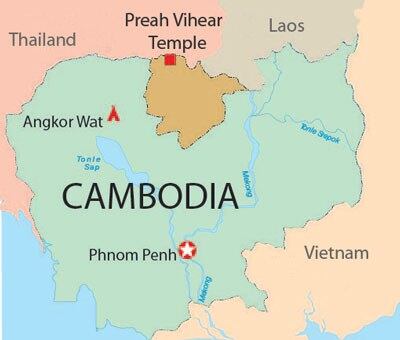Thailand and Cambodia have agreed to allow civilian and unarmed Indonesian military observers to be stationed along their common border in order to defuse tensions following a bloody battle over a disputed area, according to officials.
The agreement, which will see as many as 40 Indonesian observers move to the area, was brokered by the foreign ministers of the 10-member Association of Southeast Asian Nations (ASEAN) during an emergency meeting in Jakarta.
Indonesia currently holds the rotating chair of ASEAN, which also comprises Brunei, Burma, Cambodia, Laos, Malaysia, the Philippines, Singapore, Thailand, and Vietnam.
Cambodian Prime Minister Hun Sen welcomed the decision, calling it a temporary stop-gap measure and saying the conflict would require further mediation through the International Court of Justice.
“This [action] is for reducing tension while waiting for a final solution on the border conflict,” he said.
“And this is a difficult solution, because one party uses a map that was recognized by the International Court at The Hague, a map that was factually written according to the verdict of the court, while the other party uses a map that was [created] unilaterally.”
Tentative ceasefire

The disputed area surrounds Preah Vihear, an 11th century Hindu temple which was established as a UNESCO heritage site in 2008.
The site was awarded to Cambodia by the World Court nearly 50 years ago, but ownership of the surrounding 4.6-square-kilometers (1.8-square-miles) of land was never fully addressed.
At least eight people have died and thousands have been displaced in the border conflict which erupted almost a month ago near Preah Vihear temple despite a tentative ceasefire agreement agreed to on Feb. 5. The border has been quiet in recent days, but troops remain cautious.
Clashes had not led to a fatality since January 2010, when a Thai soldier was shot dead following a skirmish in the area.
To maintain the ceasefire, two Indonesian teams of 20 will be stationed with the militaries of both nations on either side of the border and will report any violations to ASEAN and the U.N. Security Council.
Other details of the deployment, including when the observers would arrive and where they would be embedded along the border, were not immediately available.
The U.N. Security Council indicated its support for the ASEAN-led effort at reconciliation and called for a permanent ceasefire.
Cambodia had long called for third-party mediation in the dispute, but Thailand opposed the idea in favor of a bilateral solution. The agreement to accept the observers suggests Thailand will allow Indonesia as ASEAN chair to work toward enforcing the truce.
‘Waging peace’
ASEAN rarely intervenes in the internal affairs of its member states. The decision to send the 40 Indonesians marks the first time the body has sent observers to a dispute site since 2005, when it helped to end hostilities between rebels and government troops in western Indonesia.
AFP quoted Indonesian Foreign Minister Marty Natalegawa as calling the move a "unique arrangement" for the Southeast Asian bloc.
He added that both Thailand and Cambodia had requested "engagement" from Indonesia in future negotiations between the two nations, which will take place in Jakarta on an unspecified date.
"I would like to make it absolutely clear that ... the option of conflict, the option of use of force, is not meant to be on the table … We are ‘waging peace’ so that no more guns and artilleries make a sound in our region."
"This outcome is very important, not just on conflict resolution between Thailand and Cambodia but in capacity building by ASEAN," he said.
The border conflict has lent leverage to Thailand’s Yellow Shirt movement, which has been calling on Thai Prime Minister Abhisit Vejjajiva to take a tougher stance on relations with Cambodia.
It also followed a verdict from a Cambodian court which sentenced two Thai nationalists to jail terms of six and eight years for trespassing and spying in the border region.
Reported by RFA’s Khmer service. Translated by Sum Sok Ry. Written in English by Joshua Lipes.
